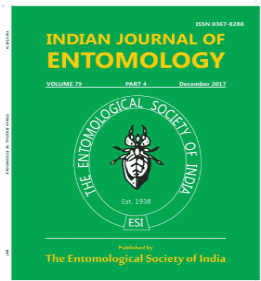Toxicity of Selective Insecticides against Trichogramma chilonis
DOI:
https://doi.org/10.55446/IJE.2023.1649Keywords:
Trichogramma chilonis, parasitoids, egg card bioassay, leaf dipped surface residue bioassay, emamectin benzoate, toxicity, entomotoxic potential, indoxacarb, flubendiamide, safetyAbstract
Entomotoxic potential of selective insecticides against Trichogramma chilonis Ishii was performed at the Toxicology Laboratory of Entomological Research Institute, Ayub Agriculture Research Institute (AARI), Faisalabad. Six insecticides viz., spinetoram, lufenuron, chlorantraniliprole, indoxacarb, flubendiamide and emamectin benzoate were tested against Trichogramma chilonis. After 3 and 24 hours of exposure to immature and adult stages of T. chilonis the observations were made. Egg card and dipped surface residue bioassays were used, to determine the mortality rate of immature and mature life stages of T. chilonis, respectively. The treatments flubendiamide, chlorantraniliprole, indoxacarb, and lufenuron are found relatively safe, whereas spinetoram and emamectin benzoate showed a high level of toxicity. After four hours, chlorantraniliprole and lufenuron showed low toxicity, flubendiamide and indoxacarb demonstrated moderate toxicity, while spinetoram and emamectin benzoate demonstrated significant toxicity for adults.
Downloads
Metrics
Downloads
Published
How to Cite
Issue
Section
References
Ahmad A Z, Ullah F, Badshah H, Khan M S, Ahmad B. 2021. Effect of bio-chemical properties of various grains on the quality rearing of factious host, Sitotroga cerealella (Olivier) and its subsequent effect on Trichogramma chilonis in vitro. Sarhad Journal of Agriculture 37(4): 1442-1449.
Asrar M, Shanawar T, Gogi M D, Azeem M, Hussain D, Anwar H, Saleem M. 2019. Selectivity of some novel insecticides against Trichogramma chilonis ishii (Hymenoptera: Trichogrammatidae). Pakistan Journal of Entomology 41(2): 121-126.
Bart S, Amossé J, Lowe C N, Mougin C, Péry A R, Pelosi C. 2018. Aporrectodea caliginosa, a relevant earthworm species for a posteriori pesticide risk assessment: current knowledge and recommendations for culture and experimental design. Environmental Science and Pollution Research 25(34): 33867-33881.
Bernhardt E S, Rosi E J, Gessner M O. 2017. Synthetic chemicals as agents of global change. Frontiers in Ecology and the Environment 15(2): 84-90.
Caltagirone L E. 1981. Landmark examples in classical biological control. Annual Review of Entomology 26(1): 213-232.
Fletcher S J, Reeves P T, Hoang B T, Mitter N. 2020. A perspective on RNAi-based biopesticides. Frontiers in Plant Science 11: 51.
Hamed M, Nadeem S. 2012. Effect of cereals on the development of Sitotroga cerealella (Olivier) (Lepidoptera: Gelechiidae) and subsequent quality of the egg parasitoid, Trichogramma chilonis (Ishii) (Hymenoptera: Trichogrammatidae). Pakistan Journal of Zoology 44(4): 923-929.
Hedlund J, Longo S B, York R. 2020. Agriculture, pesticide use, and economic development: a global examination (1990-2014). Rural Sociology 85(2): 519-544.
Jalali S K., Mohanraj P, Lakshmi B L. 2016. Trichogrammatids. Ecofriendly pest management for food security. Academic Press. pp. 139-181.
Jallow M F, Awadh D G, Albaho M S, Devi V Y, Thomas B M. 2017. Pesticide risk behaviors and factors influencing pesticide use among farmers in Kuwait. Science of the Total Environment 574: 490-498.
Khan M A. 2019. Integration of selected novel pesticides with Trichogramma chilonis (Hymenoptera: Trichogrammatidae) for management of pests in cotton. Journal of Agricultural Science and Technology 21(4): 873-882.
Klich D, Łopucki R, Stachniuk A, Sporek M, Fornal E, Wojciechowska M, Olech W. 2020. Pesticides and conservation of large ungulates: Health risk to European bison from plant protection products because of crop depredation. PLoS One 15(1): e0228243.
Lamichhane J R, Dachbrodt-Saaydeh S, Kudsk P, Messéan A. 2016. Toward a reduced reliance on conventional pesticides in European agriculture. Plant Disease 100(1): 10-24.
Lechenet M, Dessaint F, Py G, Makowski D, Munier-Jolain N. 2017. Reducing pesticide use while preserving crop productivity and profitability on arable farms. Nature Plants 3(3): 1-6.
Nisar N, Shah S F, Sarwar J, Amin F, Rasheed I. 2020. 43. Impact of Trichogramma chilonis on tomato fruit worm (Helicoverpa armigera Hub.) in tomato crop. Pure and Applied Biology (PAB) 9(1): 443-447.
Paiva A C R, Beloti V H, Iost Filho F H, Yamamoto P T. 2021. Acute toxicity and duration of harmful activity of nine insecticides on Trichogramma pretiosum, a parasitoid used in augmented biological control of Helicoverpa spp. in Brazilian soybean fields. International Journal of Pest Management pp. 1-9.
Serrano E, Munoz M, de Pedro Z M, Casas J A. 2020. Fast oxidation of the neonicotinoid pesticides listed in the EU Decision 2018/840 from aqueous solutions. Separation and Purification Technology 235: 116168.
Shah M S, Khan I A, Salman M, Ahmad J, Akbar I, Shah J A, Sarwar M. 2015. Study on different life parameters of Trichogramma chilonis (Ishii) on eggs of Sitotroga cerealella (Olivier) fed on old and new varieties of wheat, maize and sorghum.Journal of Entomology and Zoology Studies 3(6): 397-400.
Wyckhuys K A, Tang F H, Hadi B A. 2023. Pest management science often disregards farming system complexities. Communications Earth and Environment 4(1): 223.
Zeinalzadeh L, Karimi-Malati A, Sahragard A. 2016. Effect of four commercial barley varieties on life table parameters of Sitotroga cerealella (Olivier) (Lepidoptera: Gelechiidae). Journal of Crop Protection 5(2): 293-305.















